The AnandTech Coffee Lake Review: Initial Numbers on the Core i7-8700K and Core i5-8400
by Ian Cutress on October 5, 2017 9:00 AM EST- Posted in
- CPUs
- Intel
- Core i5
- Core i7
- Core i3
- 14nm
- Coffee Lake
- 14++
- Hex-Core
- Hyperthreading
Shadow of Mordor
The next title in our testing is a battle of system performance with the open world action-adventure title, Middle Earth: Shadow of Mordor (SoM for short). Produced by Monolith and using the LithTech Jupiter EX engine and numerous detail add-ons, SoM goes for detail and complexity. The main story itself was written by the same writer as Red Dead Redemption, and it received Zero Punctuation’s Game of The Year in 2014.
A 2014 game is fairly old to be testing now, however SoM has a stable code and player base, and can still stress a PC down to the ones and zeroes. At the time, SoM was unique, offering a dynamic screen resolution setting allowing users to render at high resolutions that are then scaled down to the monitor. This form of natural oversampling was designed to let the user experience a truer vision of what the developers wanted, assuming you had the graphics hardware to power it but had a sub-4K monitor.
The title has an in-game benchmark, for which we run with an automated script implement the graphics settings, select the benchmark, and parse the frame-time output which is dumped on the drive. The graphics settings include standard options such as Graphical Quality, Lighting, Mesh, Motion Blur, Shadow Quality, Textures, Vegetation Range, Depth of Field, Transparency, and Tessellation. There are standard presets as well.
We run the benchmark at 1080p and a native 4K, using our 4K monitors, at the Ultra preset. Results are averaged across four runs and we report the average frame rate, 99th percentile frame rate, and time under analysis.
All of our benchmark results can also be found in our benchmark engine, Bench.
MSI GTX 1080 Gaming 8G Performance
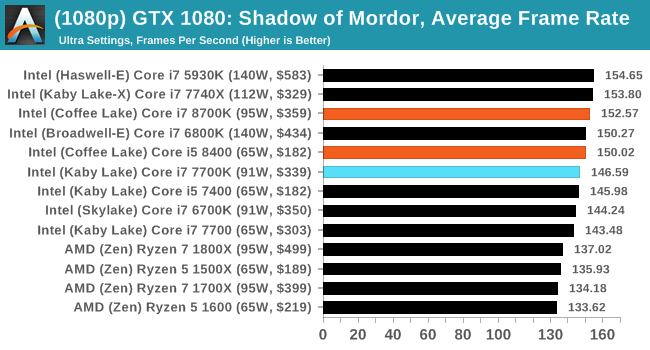
1080p

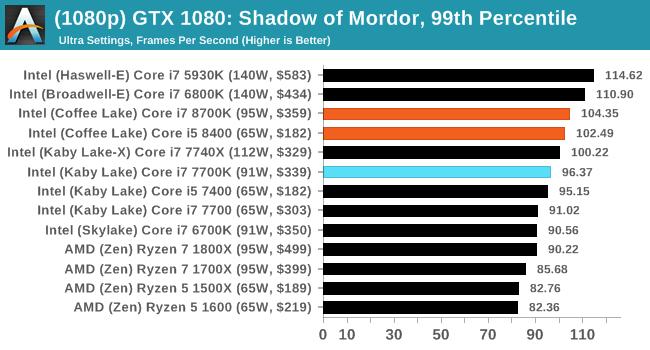
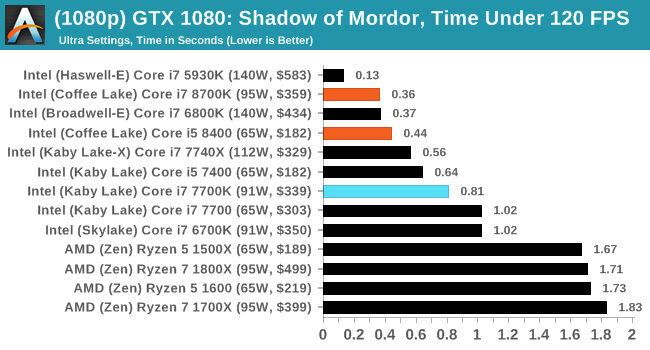
4K
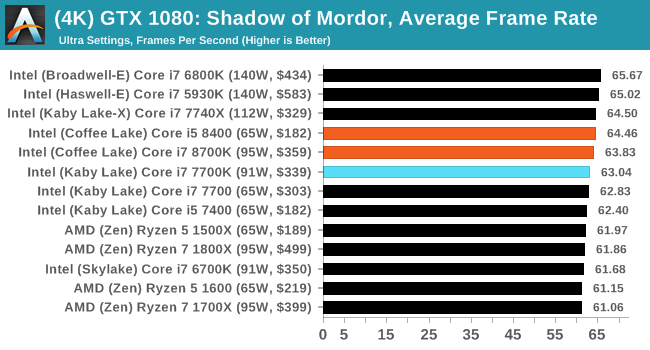
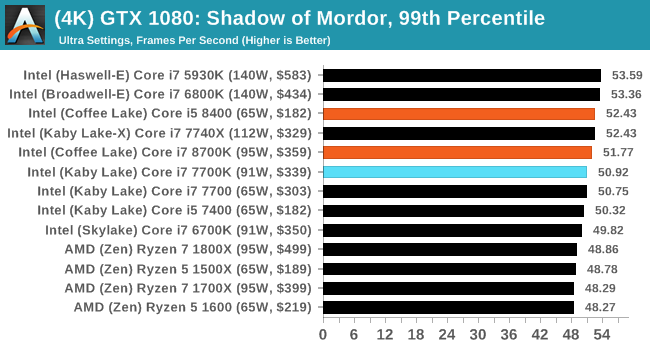
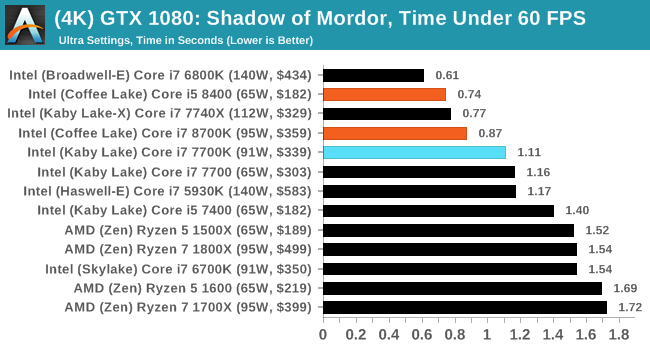


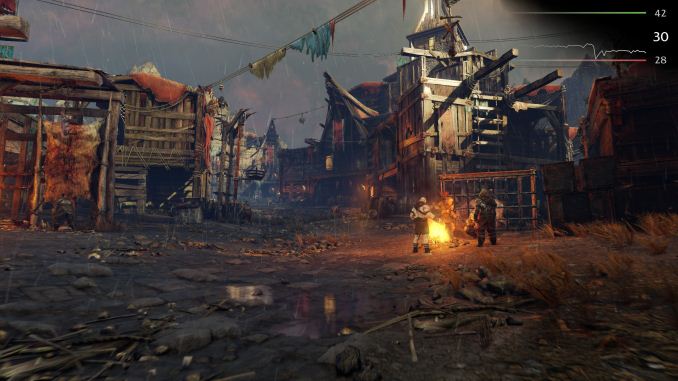
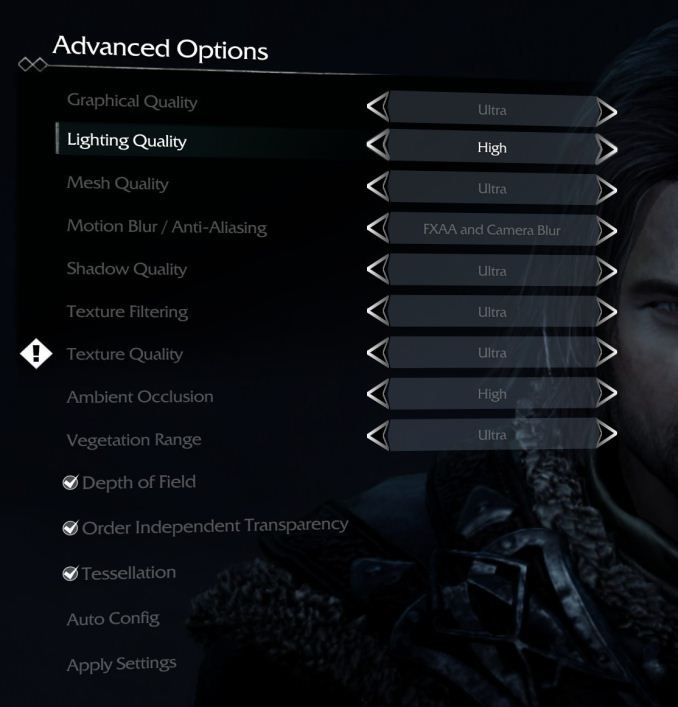








222 Comments
View All Comments
mapesdhs - Friday, October 6, 2017 - link
Any idea what that optimisation is? Seems odd that adding extra pure cores would harm performance, as opposed to adding HT which some games don't play nice with. Otherwise, are you saying that for this test, if it was present, the i3 8100 would come out on top? Blimey.Ian Cutress - Saturday, October 7, 2017 - link
They're either doing something to align certain CPU tasks for AVX, or it's bypassing code. You'd have to ask the developers on that.mapesdhs - Monday, October 9, 2017 - link
I doubt they'd explain what's happening, might be proprietory code or something.WickedMONK3Y - Thursday, October 5, 2017 - link
You have the spec of the i7 8700K slightly wrong. It has a base frequency of 3.7GHz not 3.8GHz.https://ark.intel.com/products/126684/Intel-Core-i...
Ian Cutress - Thursday, October 5, 2017 - link
Mistake on our part. I was using our previous news post as my source and that had a Typo. This review (and that news) should be updated now.Slomo4shO - Thursday, October 5, 2017 - link
Ian, this is probably your worst review to date. Lackluster choice of CPUs, mid-grade GPU, and lack of direct competition in the product stack... Why would you not use a GTX 1080 Ti or Titan XP?Ian Cutress - Thursday, October 5, 2017 - link
All the CPUs we've ever tested are in Bench. Plenty of other data in there: the goal was to not put 30+ CPUs into every graph.Our benchmark database includes over 40 CPUs tested on the GTX 1080, which is the most powerful GPU I could get a set of so I can do parallel testing across several systems. If that wasn't enough (a full test per CPU takes 5 hours per GPU), the minute I get better GPUs I would have to start retesting every CPU. At the exclusion of other content. Our benchmark suite was updated in early Q2, and we're sticking with that set of GPUs (GTX 1080/1060/R9 Fury/RX 480) for a good while for that reason.
Note I had three days to do this review.
crimson117 - Thursday, October 5, 2017 - link
Good job! More people need to know about the bench...Slomo4shO - Thursday, October 5, 2017 - link
To be fair the R5 1600 was added to the benches after the fact. In addition, your othwr reviews tend to be much more detailed and data driven with relevant products and multiple GPUs.Why would I read your review if you expect me to dig through your benchmark to obtain relivant data?
I can understand and appreciate the time crunch but it is a poor excuse for some of the decisions made in this review.
Take it with a grain of salt, this was not your best work.
mapesdhs - Friday, October 6, 2017 - link
Ooohhh the effort of examing the data in Bench! :D First world problems. Sheesh...Run your own tests then, see how you get on with having a life. It's insanely time consuming.